On Loving Books
MY MOM'S GREEN BORSCH RECIPE + ALTERNATIVE SAUCE FOR LAZY HOLUBTSI
I was struggling to come up with a title for today’s newsletter so I decided to take inspiration from ancient Roman authors and one of my favorite contemporary food writers, Alicia Kennedy. It’s actually crazy to think that the majority of ancient texts didn’t have titles. Instead, texts were referred to by number, subject, author, or opening/ending words or some combination of these. Many of the titles we see today for ancient texts were actually made up by medieval and Renaissance scribes. But I digress.
Last week I read Laura Fenton’s latest substack and I can’t stop thinking about it. In it, Lauren describes her relationship with books. She starts by saying “Books have always been one area in which I am decidedly not a minimalist.” I am the exact same. My life feels empty without books. Lauren’s essay reminded me of just how much these objects mean to me. In this short personal essay, I want to share a little bit about my own relationship with books and why my personal library means so much to me.
As a college freshman, I arrived at The Ohio State University with two suitcases and maybe a total of 4 books. Living in a college dorm is of course not very conducive to having a large book collection but I did start to slowly build up my personal library here in the U.S. Any chance I got, I would walk to Barnes & Noble and buy myself a book in an attempt to remedy the insane loneliness and emptiness I often felt.
At this time in my life, in 2024, my book collection is spread across two continents and two countries—used to be three. Between my partner and I, we have close to a thousand or so books here in Austin, and probably a couple thousand if we were to combine all of our books, Tom’s from Ohio and mine from Barcelona.
Additionally, as a trained historian, I always think of books as some of the most important objects of cultural heritage. Without them, we would have very little evidence of what people thought, felt, experienced, contemplated, feared, ate, etc. Books represent the cultures and societies that produced them—the people who wrote, designed, printed, bound, and of course read them. Which books are preserved and which are discarded is indicative of the values and biases of those who made those decisions. Books are physical manifestations of thoughts, ideas, and beliefs. The physicality of books gives ideas a physical form allowing them to fill our personal and public spaces.
To be completely honest, I feel quite anxious publicly sharing photos of my books. Books can be incredibly personal. They give people a sense of who we are. By looking at someone’s bookshelves you can tell what their interests are, what types of authors they read or want to read, what ideas or philosophies they are familiar with, and so much more. I’m also worried about showing you all my incredibly chaotic bookshelves. As you can see from the photos, my bookshelves are buckling from the weight of all the paper. They are mostly organized by subject, but due to limited shelf space, I needed to get a little creative. I’m hopeful that the next place I move to will allow me to design a type of space and shelving that can accommodate all of our books. I can’t wait to be able to display my books in a safe and organized manner. A girl can dream!
Every time I visit my parents in Barcelona, I go through my books as one would through photo albums. Books like photographs hold specific memories, both good and bad. Each book is connected to a specific period of my life. Back in my tennis playing days, I used to sneak away between practice, find a secluded spot behind tennis courts, and read. That’s where I read Crime and Punishment by Fyodor Dostoevsky and poems of Taras Shevchenko for the first time.
Books will forever be synonymous with birthdays. My parents, specifically my dad, used to gift me books for my birthday. On my 15th birthday, my dad bought me my first rare collectible book—a collection of short stories by Gogol from the late 19th century. Nowadays, my husband, Tom, and mother-in-law, Victoria, get me the most beautiful cookbooks for my birthdays. These incredible objects will always be one of my favorite gifts. A book is a beautiful object full of ideas. You can engage with, draw inspiration from, discover from, and expand on what you read by contributing your own thoughts to the discourse these texts are engaged in. What more can one ask for?
I have a special affinity for cookbooks. They can tell us so much more than just the recipes, things such as—cooking practices, dietary preference, food trends, values, and culinary traditions of those who wrote them and of those who cooked from them. I need to be physically surrounded by cookbooks when I’m recipe developing. Honestly, if I am ever struggling with motivation or inspiration, looking and reading through my cookbook collection usually does the trick.
One of my long term goals is to create an inventory of all my cookbooks and a database with all of their recipes. There’s actually a website that already does this for you, for a monthly subscription fee, it is called Eat Your Books. Sharing this in case you also have a massive cookbook collection. This resource is especially great for those of us who might struggle with planning. In mere minutes, you can search through your whole cookbook collection for recipes by specific ingredients, type of dish, etc. It can be especially helpful if you are searching for a recipe but can’t remember what cookbook it came from. Eat Your Books doesn’t have the full recipes themselves, for copyright reasons, but it makes searching through you cookbook collection a breeze. This is not an ad, I am just sharing this resource in case someone finds it helpful.
You might be wondering where my love for books comes from. To be honest, I am not entirely sure myself, but I do think it has a lot to do with my grandmother. My grandmother was a bibliophile. Her house in Mariupol was full of books. My grandmother’s personal library was made up primarily of Ukrainian and Russian works but she also had a ton of American, English, French, Greek, Italian, and German literature. Did I mention that my grandmother was a polyglot? I will have to tell you that story some other time.
Sadly, my grandmother’s books were destroyed by the Russians and their senseless cruel war. The war took my city and my grandmother’s books. I have so much regret for not getting them out in time. I feel a tremendous amount of guilt. I’m still trying to process it all. I feel like I failed my grandmother. Most of her books are gone except for a handful that we were able to bring back from our visits. Sadly due to the ongoing conflict that began in early 2014, I haven’t been able to visit Mariupol since the end of 2013. Having just read my essay on loving books you can understand how incredibly painful it was to lose them and everything they embodied.
I will end it here, but there is so much more I want to say on this topic. I hope this short essay inspires you to reflect and assess your own relationship with books.
RECIPE OF THE WEEK:
My Mom’s All Year Round Ukrainian Green Borsch Recipe:
I love green borsch. I love this dish so much, I even wrote about it over on Serious Eats. When developing the recipe for Serious Eats, I did a lot of research. I looked at old 19th century Ukrainian cookbooks and a 16th century Polish manuscript. I wanted to create a recipe rooted in tradition and reflective of the abundance of spring. You can read it here along with the recipe.
This is my mom’s version and it can be made all year round. Instead of using fresh sorrel this recipe calls for canned/jarred sorrel also referred to as salted, preserved, or pickled sorrel. You can buy it online or at your local Eastern European market.
Ingredients:
1.5 lbs pork ribs
10 whole peppercorns
4 bay leaves
8 cups of water
2 tablespoons olive oil
1 large onion, finely diced
2 medium carrots, thinly sliced crosswise into rounds
2 large russet or gold potatoes, chopped into 1-inch cubes
½ teaspoon ground black pepper
1 12.30 oz jar of sorrel (350 grams)
2 large eggs, well beaten
1 bunch dill, finely chopped
4 hard boiled eggs, peeled and roughly chopped
Salt to taste
Smetana or crème fraîche
Sourdough rye bread or rustic loaf of any kind
Method:
In a large pot, add the pork ribs, peppercorns, bay leaves, and salt. Cover with 2 quarts (8 cups) water, or until the bones are just covered (no more than 10 cups) and bring to boil over medium-high heat. Lower heat to maintain a gentle simmer and cook, uncovered, until ribs are fork-tender, about 1 1/2 hours. Skim off any impurities that rise to the surface.
Meanwhile, in a skillet, heat oil over medium heat, add onion and cook, stirring, until softened and just lightly browned, about 10 minutes.
When the pork ribs are tender, add sautéed onion, carrots and potatoes to the pork broth. If there isn’t enough broth add enough water to just cover the solids, return to a simmer. Cook until the potatoes are tender, about 20 minutes.
When the potatoes and carrots are tender add a jar of sorrel and cook for about 5 minutes.
Slowly pour the beaten eggs into the pot in a thin steam while constantly whisking until egg drop soup–like curds form, cook for 2 minutes.
Remove from heat and let borsch rest covered for about 30 minutes. Ladle borsch into bowls and top with chopped boiled eggs and dollops of crème fraîche. Serve with sourdough bread.
PUBLISHING NEW:
I forgot to share my latest publication with you all! My first recipe for Bon Appétit is now LIVE. The recipe is for Lazy Unstuffed Ukrainian Cabbage Rolls or Holubtsi. The recipe is getting great reviews which makes me so happy! I tested this recipe a lot! I wanted to get it just perfect.
I also wanted to share an alternative version of the sauce. This is my family’s personal favorite variation! Sour cream based sauce is the more traditional version of the dish. Let me know if you have any questions!
CREAMY TOMATO SAUCE:
1 cup sour cream (300 grams)
1 24 ounce bottle tomato purée or passata (3 cups)
1 teaspoon aleppo pepper (to taste)
¼ teaspoon ground black pepper
½ teaspoon table salt
METHOD:
Replace STEP 4 of the linked recipe with the following.
To the large bowl with ⅓ of the onion and carrot mixture add sour cream, tomato puree, aleppo pepper, ground black pepper and salt, stir until combined. Pour the sauce gently over the rolls and place the pan into a preheated oven for 45 minutes or until cooked through and the sauce has thickened and is bubbling at the edges. Let cool slightly.
CHEESECAKES:
Cheesecake spots through the end of February are now LIVE! Order yours today.
SUPPORT MY WORK BY BECOMING A PAID SUBSCRIBER:
Please consider becoming a paid subscriber! Your paid subscriptions go towards recipe testing and development, video/photography, and cookbook writing. I am a big advocate of open access information and my priority is to keep the newsletter accessible to all. Those of you who can support my work monetarily are keeping the newsletter free for all!
If you prefer to make a one time donation, my venmo is @ogitheyogi.



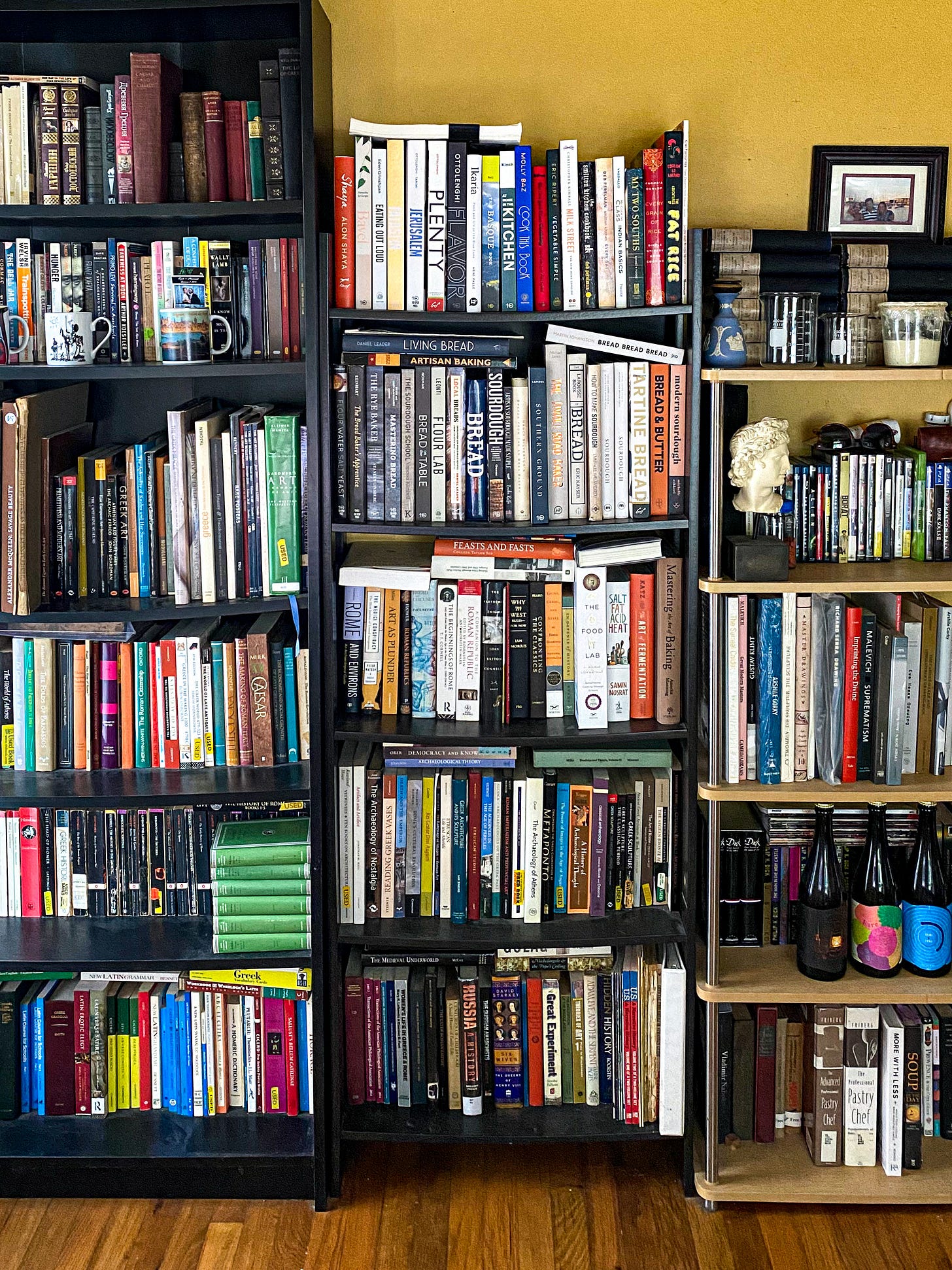
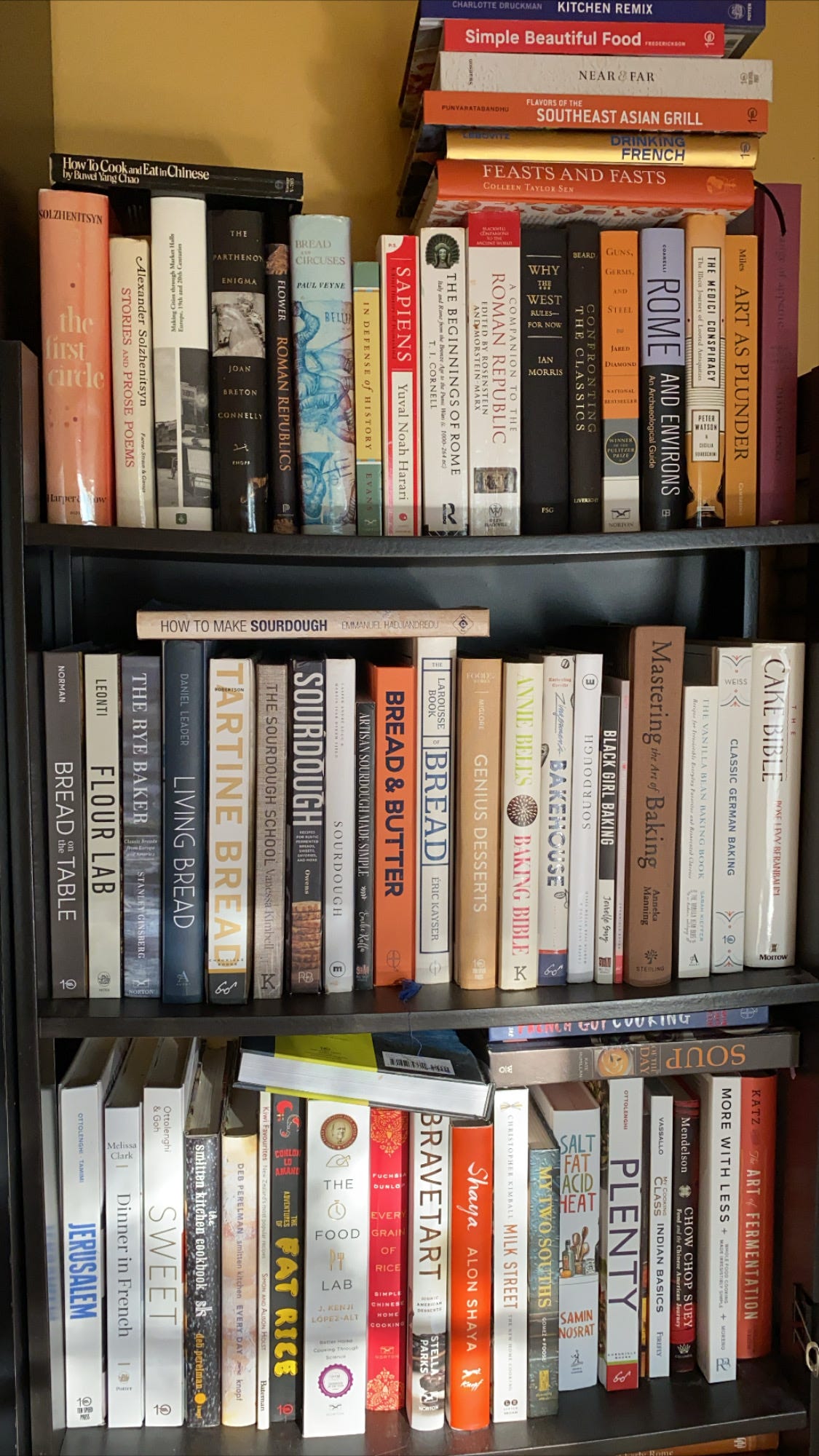
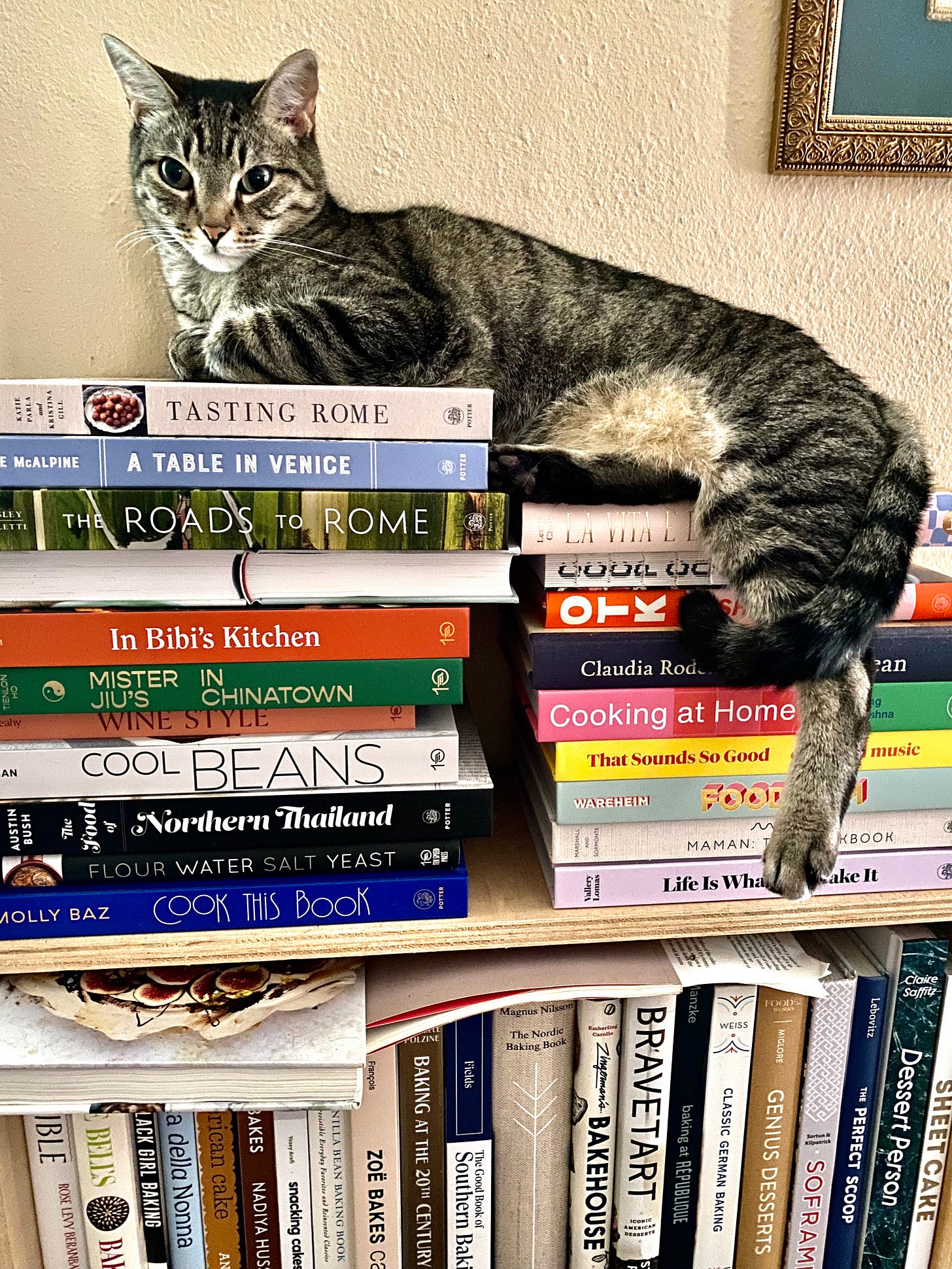
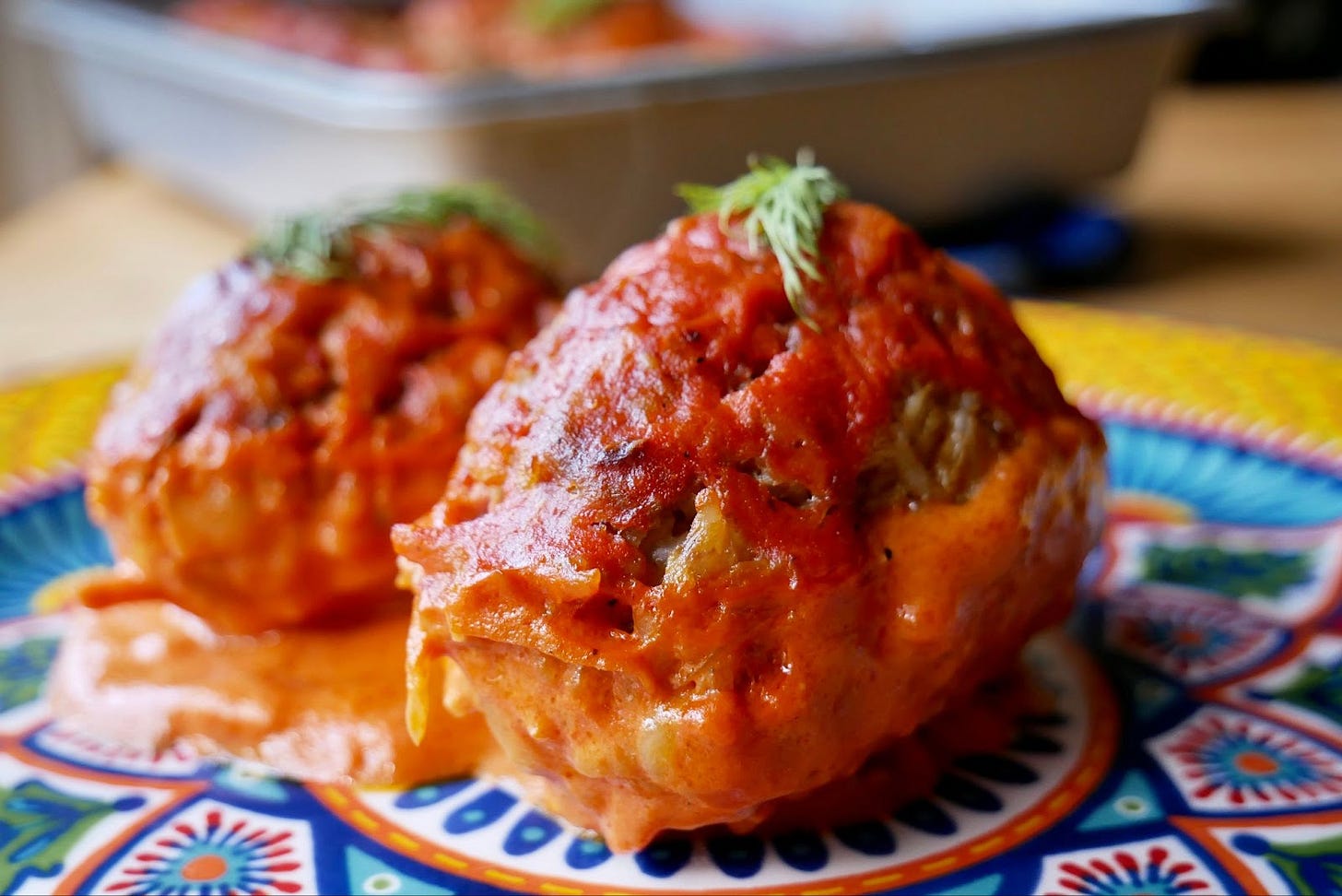
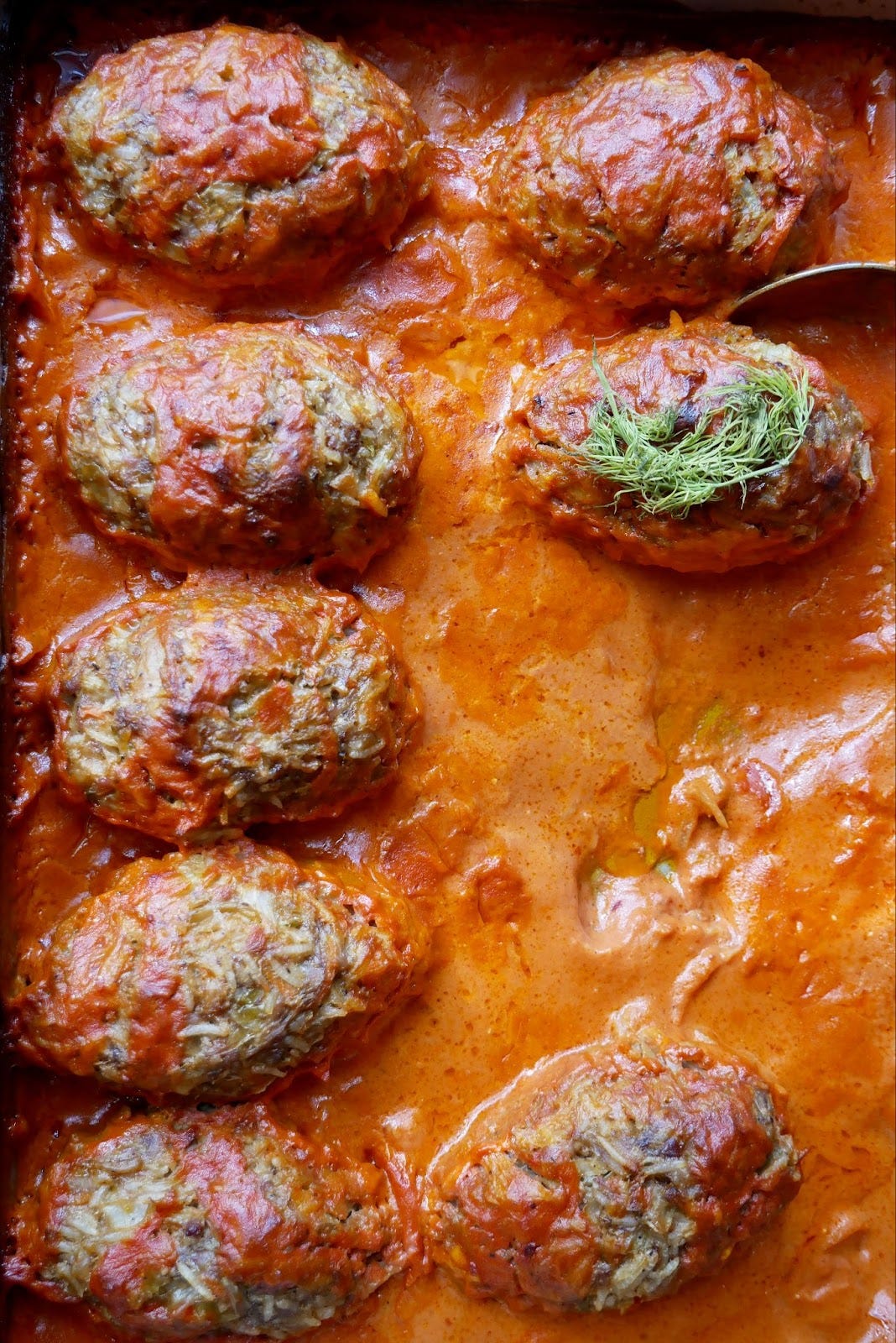
I loved reading about and seeing your books. It was fun to notice that some of your books are also in my own bookshelves. Thanks for this great post and recipes.
This is a great newsletter... the books are so much a part of your household. In Ohio there are two more large bookcases full of great books.... It's important to have your own library.